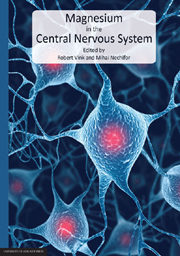Book contents
- Frontmatter
- List of Contributors
- Preface
- Contents
- Section 1 Magnesium in Normal Brain
- Section 2 Magnesium in Neurological Diseases
- Section 3 Involvement of Magnesium in Psychiatric Diseases
- Chapter 18 Magnesium and Alzheimer's disease
- Chapter 19 Magnesium and stress
- Chapter 20 Magnesium in neuroses
- Chapter 21 Magnesium, hyperactivity and autism in children
- Chapter 22 Magnesium in psychoses (schizophrenia, bipolar disorder)
- Chapter 23 Magnesium and major depression
Chapter 24 - Magnesium in drug abuse and addiction
from Section 3 - Involvement of Magnesium in Psychiatric Diseases
Published online by Cambridge University Press: 05 June 2012
- Frontmatter
- List of Contributors
- Preface
- Contents
- Section 1 Magnesium in Normal Brain
- Section 2 Magnesium in Neurological Diseases
- Section 3 Involvement of Magnesium in Psychiatric Diseases
- Chapter 18 Magnesium and Alzheimer's disease
- Chapter 19 Magnesium and stress
- Chapter 20 Magnesium in neuroses
- Chapter 21 Magnesium, hyperactivity and autism in children
- Chapter 22 Magnesium in psychoses (schizophrenia, bipolar disorder)
- Chapter 23 Magnesium and major depression
Summary
Abstract
Addiction to different substances is considered to be a psychiatric disorder. Magnesium reduces the intensity of addiction to opiates and psychostimulants (cocaine, amphetamine, nicotine, cocaine and others). It also decreases the auto-administration of cocaine and the relapse into cocaine and amphetamine intake, as well as reducing the experimental addiction to morphine, cocaine and other substances in animals. In heroin addicts, alcohol consumers and other drug abusers, the plasma and intracellular magnesium concentration is lower compared to healthy subjects. We consider that one of the mechanisms by which magnesium reduces the consumption of some highly addictive substances is its moderate effect of stimulating the reward system. However, other main mechanisms involved in magnesium's action are the reduction of dopamine and glutamate release at presynaptic terminals in the brain, the decrease of NO synthase activity, the stimulation of GABAergic system activity, the reduction of postsynaptic NMDA receptor activity, and the reduction of some neuromediators released by Ca2+ and acting at calcium channels. Apart from the action of magnesium ions during emerging addiction, administration of this cation after the appearance of withdrawal syndrome reduces the intensity of the clinical symptoms. There are data that show that stress increases the vulnerability of people to develop addiction to different substances, and also reduces drug-free time and increases the incidence of relapse in heroin addicts. Stress increases catecholamine release and stimulates magnesium release from the body. This decrease in magnesium concentration is one of the important factors that hastens relapse.
- Type
- Chapter
- Information
- Magnesium in the Central Nervous System , pp. 333 - 344Publisher: The University of Adelaide PressPrint publication year: 2011



